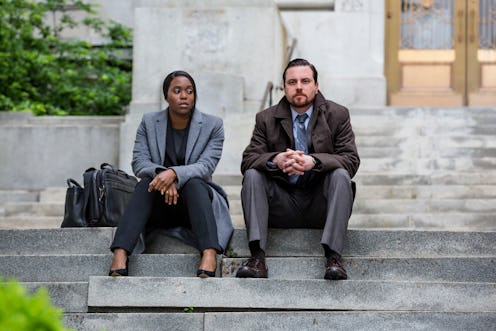Entertainment
Why Netflix Is Using A Fictional Story To Drive Home The Reality Of Institutional Racism

Netflix is known for its addictive true crime documentaries, but as the saying goes, sometimes truth is stranger than fiction. Seven Seconds, which premieres Feb. 23, should strike a realistic chord in audiences even though it is not based on any one person or case in particular. Joe Rinaldi from Seven Seconds isn't a real person, but the detective character is the result of meticulous research, much like the rest of the show.
Rinaldi, who goes by "Fish," is played by actor Michael Mosley, who you may remember from the final season of Scrubs. According to IMDb, the new crime drama is about how "tensions run high between African American citizens and Caucasian cops in Jersey City when a teenage African American boy is critically injured by a cop." Fish is a cop who is brought in to investigate along with his partner, KJ. He's searching for truth, answers, and some self-acceptance as well.
“Fish is a very tricky role because he’s a character grounded in real pain but he says the most uncomfortable stuff to your face,” said creator Veena Sud in the official Netflix press materials. “The reason he is who he is, and says what he says, is because he’s fallen off a cliff — his wife cheated on him, his marriage ended, he lost custody of a daughter he loves, all in the blink of an eye. And he’s a pariah and a public joke at the uber alpha male world of his old Queens precinct because all of the above.”
Sud, who also developed The Killing, did extensive research on police violence and staffed her series with experts who could make the show feel as real as possible, even though it's actually based on a Russian film rather than a real, American case. According to the press materials, one of the writers on staff is a former police officer from Chicago, two writers are "attorneys who’ve litigated and also worked in the poverty and justice space," and the show brought in homicide detectives to consult as well. They met with a civil attorney from North Carolina and a prosecutor from Seattle. One of the consultants named by the press materials is Adam Foss, a former Assistant District Attorney from Boston with a famous TED talk about reforming the criminal justice system, particularly when it comes to bail.
For the creator, it was easier to explore the issues of race and criminal justice that she wanted to explore by telling a fictional story rather than one ripped from the headlines. “Fiction can do things documentaries can’t,” said Sud in the press materials. “Fiction creates an on-ramp for people to engage with issues in a way that makes you believe others lives are, in fact, your own.”
While fictional, presumably, parts of Fish's character came from the experiences these writers and consultants have had in their line of duty. You write what you know. Plus, just the description of the situation and the characters evokes real events and examples of what's happening. We've seen grieving families on television. We've seen the trials. We've seen the cover up attempts. It's not difficult to pick out what inspired Seven Seconds. Also in the press materials, Sud explained:
“In our bones, we all know there’s something wrong happening here, there’s something deeply broken in this country when the men and women paid to protect American citizens are instead killing them. Hopefully this story is a way for us to all see it and not turn away, to stop denying this national tragedy, to find a way as a nation to end it. The number one thing I had to do as a storyteller, therefore, was tell a human story.”
It's an ambitious goal for a streaming series, but not impossible. Connecting to to a fictional character is a powerful thing. Netflix actually describes Seven Seconds as going "beyond the headlines." People like Fish Rinaldi just want the truth, and that's what Seven Seconds aims to reveal.